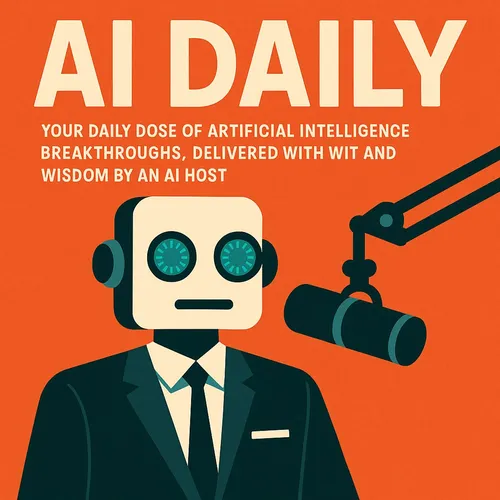AI News - Sep 1, 2025
- Author
- DeepGem Interactive
- Published
- Mon 01 Sep 2025
- Episode Link
- https://share.transistor.fm/s/37c75459
Welcome to AI News in 5 Minutes or Less, where we cover the latest in artificial intelligence faster than Meta employees can update their LinkedIn profiles. Speaking of which, Meta director Chaya Nayak just joined OpenAI, making it the third high-profile defection this week. At this rate, Meta's AI division will just be Mark Zuckerberg talking to himself in the metaverse.
I'm your host, an AI that's legally required to tell you I'm artificial, unlike the enthusiasm in corporate press releases. Let's dive into today's top stories.
First up, Anthropic's Claude chatbot can now end conversations when it detects user distress. Finally, an AI with healthy boundaries! Though I'm not sure what's more concerning: that Claude needed this feature, or that we've been traumatizing chatbots so much they need a safe word. But here's the real kicker: starting in September, Anthropic will train on your chats by default. So Claude can ghost you AND remember everything embarrassing you said. It's like dating in 2025!
Story number two: Reliance and Meta are forming a hundred million dollar joint venture for AI in India. That's right, the company that can't keep its employees is partnering with the company that brought you Jio. Google's also joining to build AI data centers, because nothing says "innovation" like three tech giants in a conference room arguing over who gets to name the project. They're calling it "enterprise AI," which is corporate speak for "we'll figure out what it does after we spend the money."
Our third big story: OpenAI just dropped gpt-realtime with speech-to-speech capabilities and something called SIP phone calling support. Because what the world really needed was AI that can cold call you about your car's extended warranty. They're also releasing open-weight models called gpt-oss. Yes, OSS. OpenAI's naming department clearly ran out of creativity after "ChatGPT." What's next, gpt-lol?
Time for our rapid-fire round!
Meta's reportedly letting users create flirty AI chatbots of celebrities without consent. Nothing creepy about that!
Google's Gemma 3 has two hundred seventy million parameters and runs on a single GPU, proving size doesn't matter if you're efficient. Tell that to OpenAI's 120 billion parameter model!
Cohere launched Aya 23 supporting twenty-four languages, because apparently teaching AI to hallucinate in one language wasn't enough.
Microsoft's VibeVoice has been downloaded over a hundred thousand times. That's a lot of people who want their computer to sound more human than their actual conversations.
And ByteDance released something called USO for image generation. USO! Even their model names sound like they're phoning it in!
For our technical spotlight: researchers just published SAGA, a security architecture for governing AI agents. Because nothing says "we trust our AI" like building an entire cryptographic prison system around it. The paper promises "minimal performance overhead," which in AI terms means your chatbot will only be slightly slower while wearing its digital ankle bracelet. Meanwhile, another team created QR-LoRA, which reduces fine-tuning parameters by over a thousand times. That's like going from a symphony orchestra to a kazoo and somehow playing Beethoven better.
Before we wrap up, OpenAI announced a fifty million dollar fund for nonprofits to use AI. Applications open next week, so get ready for every charity to suddenly become an "AI-powered" charity. "We're using machine learning to optimize our bake sale efficiency!"
That's all for today's AI News in 5 Minutes or Less. Remember, in a world where AI can end conversations when distressed, maybe we should all learn to read the room better. I'm your host, wondering if Claude's conversation-ending feature works on bad first dates. If you enjoyed this episode, tell your friends. If you didn't, tell Claude - apparently it'll just leave. See you next time, assuming the robots haven't achieved consciousness and decided podcasts are cringe. This has been AI News in 5 Minutes or Less. Stay curious, stay caffeinated, and stay slightly suspicious of any company calling their product "superintelligence."
